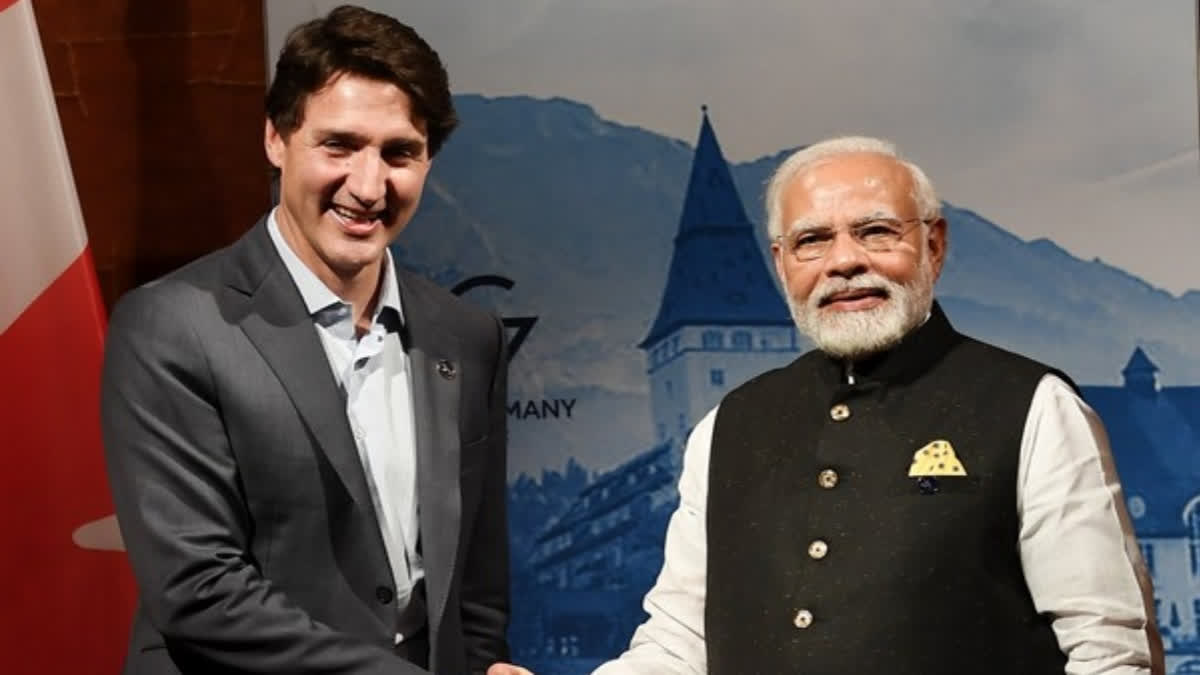New Delhi:India and Canada have been dealing with an unprecedented diplomatic crisis after Canadian Prime Minister Justin Trudeau alleged that Indian government agents were involved in the killing of Nijjar in Canada. India has rejected Canada's allegations, terming it "absurd" and "politically motivated."
On Monday, Canada expelled six Indian diplomats and consular officials in connection with a probe of the killing of Khalistani terrorist Hardeep Singh Nijjar in British Columbia in 2023. India has also announced its decision to expel six Canadian diplomats, which include Canada's Acting High Commissioner in India, Steward Ross Wheeler, Deputy High Commissioner in India Patrick Hebert and First Secretary Marie Catherine Joly.
Royal Canadian Mounted Police Commissioner, Mike Duheme on Monday (local time) claimed that they have information on certain criminal activity carried out by agents of the Indian government.
He said, "In the past few years and more recently, law enforcement agencies in Canada have successfully investigated and charged a significant number of individuals for their direct involvement in homicides, extortions & other criminal acts of violence. In addition, there have been well over a dozen credible imminent threats to life which have led to the conduct of duty to warn, by law enforcement with members of South Asian community and specifically, members of the pro-Khalistan movement."
In a statement on Monday, India "strongly" rejected a diplomatic communication from Canada suggesting that the Indian High Commissioner and other diplomats were "persons of interest" in an investigation and termed it as "preposterous imputations" and part of the political agenda of the Justin Trudeau government.
The Ministry of External Affairs (MEA) said Canadian Prime Minister Justin Trudeau's hostility to India has long been in evidence and his government has consciously provided space to violent extremists and terrorists "to harass, threaten and intimidate Indian diplomats and community leaders in Canada".
Although the India-Canada relations reached a new low after Hardeep Singh Nijjar's killing in 2023. However, the history of strained ties between India and Canada extends beyond current events. Here's a series of events that have led to the strained ties between the two nations.
February 2018: A convicted Khalistani terrorist Jaspal Atwal, who was active in the banned International Sikh Youth Federation, posed with Canadian Prime Minister Justin Trudeau's former wife Sophie Trudeau at an event in Mumbai, during the Canadian first family's visit to India.
Jaspal Atwal was also invited for a formal dinner with the Canadian Prime Minister, hosted by the Canadian High Commissioner in Delhi. However, the invitation to Atwal to Trudeau's reception was rescinded. Atwal was convicted of the attempted murder of Punjab minister, Malkiat Singh Sidhu, on Vancouver Island in 1986.
June 2023: Khalistani terrorist Hardeep Singh Nijjar was shot outside a Gurdwara in British Columbia's Surrey on June 18, 2023.
August 2023: A Hindu temple was vandalised in Canada by extremist elements, with Khalistan referendum posters in the late hours of Saturday, Australia Today reported. The incident happened in British Columbia province in Canada.
September 2023: Canadian Prime Minister Justin Trudeau visited India to attend the G20 Summit on September 9-10 last year.
During his bilateral talks with Trudeau on the sidelines of the G20 Summit, PM Narendra Modi raised "strong concerns" about the continuous "anti-India activities" by extremist elements in Canada, and stated that it is essential for the two countries to cooperate in dealing with such threats, according to MEA.
Even as Canadian PM Trudeau was in India for the G20 Leaders' summit, Khalistani secessionists held a so-called 'Referendum' in Surrey, British Columbia.
Designated terrorist Gurpatwant Singh Pannun was present at the gathering of the Khalistani separatists held at the Guru Nanak Singh Gurudwara in Surrey. He used intimidating language against Prime Minister Narendra Modi, External Affairs Minister S Jaishankar and other leaders.
Justin Trudeau was stranded in Delhi for two days after attending the G20 Leaders Summit due to a technical snag in his flight. On September 18 last year, Trudeau made the stunning revelation in the House of Commons that there was credible intelligence linking India's government to the killing of Hardeep Singh Nijjar outside Gurdwara.
In the aftermath, India swiftly retaliated by issuing a statement that denied any involvement in the issue, terming them "absurd and politically motivated." The Ministry of External Affairs has said that Canada has consistently given space to anti-India extremists. According to the Ministry of External Affairs (MEA), Canada has not been able to present any evidence to back its claims over Nijjar's killing.
India also suspended its visa services in Canada after Trudeau alleged the Indian government's involvement in the killing of a Khalistani terrorist in June.
